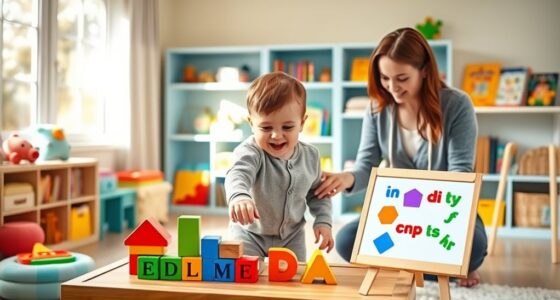To enhance brain development in infants aged 0-3 months, focus on sensory stimulation such as high-contrast visuals and soothing sounds. Tummy time exercises starting from birth help strengthen core muscles and improve head control. Use eye contact, positive reinforcement, and quality time to foster emotional bonding. Regularly talking to your baby, creating a language-rich environment, and singing promote language development. Incorporating music and movement into playtime can improve coordination and rhythm. High-contrast visuals also support vision development and cognitive skills. Engage in these activities to support your baby’s brain growth naturally.
Key Takeaways
- Engage in tummy time to strengthen core muscles and promote head control.
- Use high-contrast visuals and gentle sounds for sensory stimulation.
- Foster emotional bonding through eye contact, positive reinforcement, and quality time.
- Talk to your baby, engage in vocal interactions, and create a language-rich environment.
- Incorporate music and movement play to stimulate brain development and enhance coordination.
Sensory Stimulation Activities
Introduce high-contrast visuals like black and white images to aid in your baby's visual perception development. These bold patterns capture your baby's attention, supporting their growing ability to focus and track objects. Pairing these visuals with gentle sounds during playtime offers soothing sensory stimulation, creating a calming environment for your little one.
Additionally, providing various textures for babies to explore enhances their sensory development as they touch and feel different materials.
Engage in tummy time activities to further stimulate your baby's senses and promote physical development. This essential practice not only helps prevent flat spots on your baby's head but also strengthens their neck, back, and shoulder muscles.
Incorporating tummy time into your daily routine alongside high contrast visuals and gentle sounds can contribute significantly to your baby's overall sensory and motor skills development.
Tummy Time Exercises

Engage your baby in tummy time exercises starting from birth to foster core muscle strength and support their developmental progress in the first few months of life. Tummy Time activities are crucial for your baby's physical development and can greatly strengthen their core muscles. By incorporating short sessions of Tummy Time into your daily routine, you can help improve your baby's neck and head control, laying a foundation for their motor skills.
To make Tummy Time more enjoyable and effective, consider the following tips:
| Activities | Benefits | Tips |
|---|---|---|
| Positioning on Chest | Enhances body awareness and bonding | Sing or talk to your baby during Tummy Time sessions |
| After Diaper Changes | Aids in physical development | Place colorful toys within reach to encourage movement |
| Singing and Toy Placement | Encourages consistent participation | Use a rolled-up towel to support your baby's chest |
Emotional Bonding Techniques
Utilize eye contact as a significant tool to stimulate brain development and establish a strong emotional bond with your newborn baby. Engaging in eye contact with your little one not only aids in their cognitive growth but also fosters emotional bonding and trust. By using exaggerated facial expressions, you can further enhance this connection and promote a sense of security in your baby.
Encouraging positive reinforcement, such as smiles and gentle touches, strengthens the parent-child bond and helps your baby feel loved and understood.
Spending quality time together is essential for building a solid emotional connection and supporting social development in your baby. Whether it's cuddling, playing, or simply being present, these moments of closeness contribute to the growth of trust and emotional well-being.
Language Development Strategies

Talking to your baby often, reading books with simple pictures, and singing songs or nursery rhymes are all effective ways to boost your baby's language development.
By engaging in vocal interactions, reading aloud, and singing to your little one, you're helping them acquire new words and enhance their cognitive skills.
Creating a language-rich environment early on sets the stage for your baby's learning and linguistic growth.
Vocal Interaction Techniques
To facilitate your baby's language development, interact frequently through vocal exchanges using simple, clear speech and varied tones. Talk to your baby, sing songs, and engage in playful vocal interactions to expose them to different sounds and rhythms. Encourage turn-taking by pausing after speaking, allowing your baby to respond in their own way. These interactions not only support language development but also enhance communication skills and promote bonding between you and your baby.
Maintain eye contact while speaking to your baby to create a strong connection and foster social interaction. By using a variety of tones and expressions, you can captivate your baby's attention and make the vocal interactions more engaging. Whether it's reciting nursery rhymes, describing daily activities, or simply cooing and babbling back and forth, these vocal exchanges play an important role in your baby's early language development.
Embrace these techniques to create a nurturing environment that stimulates your baby's growing communication skills.
Reading Aloud Tips
Reading aloud to babies is a beneficial practice that enhances their language skills and strengthens the bond between parents and their child. When reading aloud, using simple picture books with high-contrast images can capture your baby's attention and support cognitive development.
Nursery rhymes and repetitive stories are excellent choices as they aid in language development and memory retention. To make the reading experience engaging, try incorporating different voices, tones, and facial expressions. This not only enhances your baby's listening skills but also fosters a love for storytelling.
Regular reading aloud sessions can stimulate cognitive development and lay the groundwork for future literacy skills. Remember, the goal isn't just to read the words but to create an interactive and enjoyable experience that promotes language development and bonding with your little one.
Singing to Baby
Engage your baby in the delightful practice of singing to foster their language development and cognitive skills.
Babies love the melodic tones and rhythms of music, which can aid in their cognitive development and language acquisition.
Singing to your baby exposes them to different sounds, helping them learn and understand their language better.
Simple songs and nursery rhymes are excellent tools to build your baby's vocabulary and promote early communication skills.
Additionally, spending time singing to your baby not only creates a bonding experience but can also help soothe them during fussy moments.
Research indicates that this activity can stimulate brain development in infants, laying a strong foundation for their overall growth and development.
Make singing a regular part of your interactions with your baby to support their language and cognitive development effectively.
It's one of the simple yet powerful activities to help your baby learn and enhance their language skills.
Music and Movement Play

Engage in music and movement play to stimulate your baby's brain development and promote bonding.
Use gentle music and rhythmic movements to encourage sensory exploration and cognitive growth.
Enhance physical coordination and motor skills through interactive activities like dancing, swaying, or rocking to music together.
Rhythmic Bonding Through Music
Enhance your baby's rhythmic awareness and coordination through music and movement play during the early developmental stage. Engaging in musical activities not only stimulates brain development but also enhances cognitive skills.
Through rhythmic bonding with music, you can foster an emotional connection between yourself and your baby. Movement play accompanied by music encourages physical development, helping to strengthen your baby's muscles.
By introducing different rhythms and tones through music, you can provide sensory stimulation that aids in auditory development. These experiences during the early months are vital for laying a strong foundation for your baby's overall growth and development.
Gentle Movements for Stimulation
Incorporate gentle movements with your baby, such as swaying or rocking, to stimulate brain development effectively. These movements not only aid in your baby's physical development but also play an essential role in enhancing their cognitive functions.
Here are three ways how music and movement can benefit your baby's development:
- Motor Skills Development: Gentle movements help your baby develop better control over their muscles, improving coordination and balance. Through simple swaying or rocking motions, your baby can strengthen their motor skills during this critical 0-3 month period.
- Enhanced Cognitive Development: The rhythmic motions and music incorporated into these movements create a stimulating environment for your baby's brain. This stimulation can aid in the development of cognitive abilities, such as problem-solving and memory retention.
- Sensory Experiences: Music and movement play provide sensory experiences that can help your baby explore and understand the world around them. These experiences contribute to their overall sensory development, making them more aware of their surroundings.
High-Contrast Visual Engagement

Black and white patterns are highly effective in stimulating a newborn's developing vision.
Newborns are naturally drawn to these high-contrast visuals, which can help enhance their visual tracking skills.
When engaging your baby in tummy time activities, incorporating black and white patterns can contribute to cognitive development.
By introducing high-contrast images early on, you can support your baby's visual stimulation and engagement, laying a foundation for their visual preferences and abilities.
These stark visual differences capture your baby's attention and encourage active participation in their surroundings.
This interaction with high-contrast visuals not only aids in their visual development but also promotes cognitive growth.
Frequently Asked Questions
How Can I Stimulate My Baby's Brain Development?
To stimulate your baby's brain development, engage in activities like skin-to-skin contact for bonding, use high-contrast visuals, play soft music, offer tactile exploration with different textures, and encourage gentle rocking or movement to support motor skills development.
What to Teach a 0-3 Month Old Baby?
Teach your 0-3 month old baby through skin-to-skin contact, high-contrast visuals, soft music, different textures, and gentle movement. These activities promote bonding, stimulate their senses, support brain development, and enhance motor skills in this pivotal stage of growth.
What Is an Activity That Promotes an Infant's Brain Development?
You'll adore how simply cuddling your little one can supercharge their brain development. Skin-to-skin contact fosters bonding and stimulates their growing mind. So grab that baby and give them all the snuggles!
What Are 3 Ways That You Can Increase the Development of an Infant's Brain?
To boost an infant's brain development, engage in skin-to-skin contact for bonding, provide high-contrast visuals for visual perception, and use soft music for soothing. These activities stimulate brain growth and promote healthy development in babies.
Conclusion
To sum up, engaging in brain development activities with your baby can help foster their growth and learning in a fun and interactive way. By incorporating sensory stimulation, tummy time exercises, emotional bonding, language development, music and movement play, and high-contrast visual engagement, you can create a stimulating environment for your little one to thrive.
Remember, these activities aren't only beneficial for your baby's brain development, but also provide valuable bonding time for you both. Enjoy the journey of watching your baby grow and learn!










